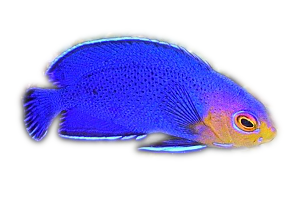
By Bob Goemans

Likely Reef Tank Suitable
Likely Fish-Only Tank Suitable
Range: Tropical Western Pacific Ocean
Natural Environment: Inhabits shallow reef environments and usually found encrusting rock and other matter such as sponges, gorgonians, and hydroids in areas receiving moderate light and moderate water movement. Forms encrusting anemone-like yellow polyps that are connected at the base via small canals, and forms groups of polyps that can attain a height of about 3 inches (7.5 cm). Receives the majority of its nutrition by capturing zooplankton.
General Husbandry: A commonly collected species and almost always available in the trade. This is a beautiful and somewhat hardy animal if fed various meaty foodstuffs, e.g., Cyclop-eeze, enriched brine shrimp (live or defrosted) or mysis. Will even accept some flake foods!
Should be placed in moderately lit areas having slow to moderate water flow. Caution is required if placed near other corals and the specimen is often fed, as it can rapidly spread onto nearby corals and harm them. Tends to dissipate if hair algae begin to grow on the same piece of substrate that it's colonizing.
Cultured specimens readily available in the trade.
Taxonomy:
Kingdom: Animalia
Phylum: Cnidaria
Class: Anthozoa
Subclass: Hexacorallia
Order: Zoantharia
Suborder: Macrocnemina
Family: Parazoanthidae
Genus: Parazoanthus
FYI: There is much thought that this species is wrongly identified, and may possibly belong in the Family Zoanthidae, Genus Acrozoanthus. And there are also questions as to whether or not this particular species contains zooxanthellae. My experience has shown that it's not capable of photosynthesizing, as I've always seen a reduction in polyp size and numbers if not fed. It just seems to waste away and get smaller if not fed.
Until there is more information on species identification, I'll continue to classify it as mentioned above. There is also a similar Atlantic species, identified as Parazoanthus axinellae.
Experience Level: Intermediate
Diet: Photosynthetic/Plankton feeder
Temperament: Semi-aggressive
Aquarium Environment: Reef or fish-only aquarium
Coral Safe:With caution
Fish Safe: Yes
Invertebrate Safe: Yes
Acclimation Time: 30 minutes+
Aquarium Hardiness: Moderate
Calcium (Ca): 380 - 430 mg/l
Alkalinity: 2.5 - 3.0 meq/l
Phosphate (PO4): <0.05 mg/l
Magnesium (Mg): approx. 1350 mg/l (relate to specific gravity)
Strontium (Sr) 8 - 10 mg/l
Temperature Range: 72 - 82°F (22 - 27°C)
Minimum Tank Size: 30 gallons
Lighting: PAR 200+
Water Movement: WM 1 - 2
Specific Gravity: 1.023 - 1.025
pH: 8.0 - 8.4
Iodine/Trace Elements Monitor/as necessary to maintain quality seawater.
